
Are you currently searching for your first home in Singapore with the intention of using it as a foundation for your entry into real estate investment? The straightforward answer is yes, your first home can indeed launch you into real estate investment. Singapore’s robust real estate market, supported by strict housing regulations, provides a relatively secure platform for entering the real estate investment arena. However, this endeavour requires a deep understanding of the real estate market, careful and wise personal financial planning, and a solid grasp of the broader economy. Especially if you plan to use your first home as a stepping stone into real estate investment in the future, an important factor to consider is developing a sound exit strategy.
This article aims to offer practical tips for beginning your real estate investment journey, using your first home as a cornerstone.
10 Key Strengths of Real Estate In Singapore
Before diving into the tips we want to share in this article, let’s first examine the 10 factors that contribute to the strength of the local real estate market.
1. Cooling Measures
The government’s 15 rounds of cooling measures, coupled with other housing initiatives, have enhanced the stability of the local real estate market, preventing volatile price fluctuations and mitigating the risk of a housing bubble.
2. Limited Land
With around 1.2 million HDB homes, 360,000 condos, and 73,000 landed properties within a limited land space, property prices are likely to remain competitive, as residents compete for housing from the pool of approximately 1.63 million homes across all types.
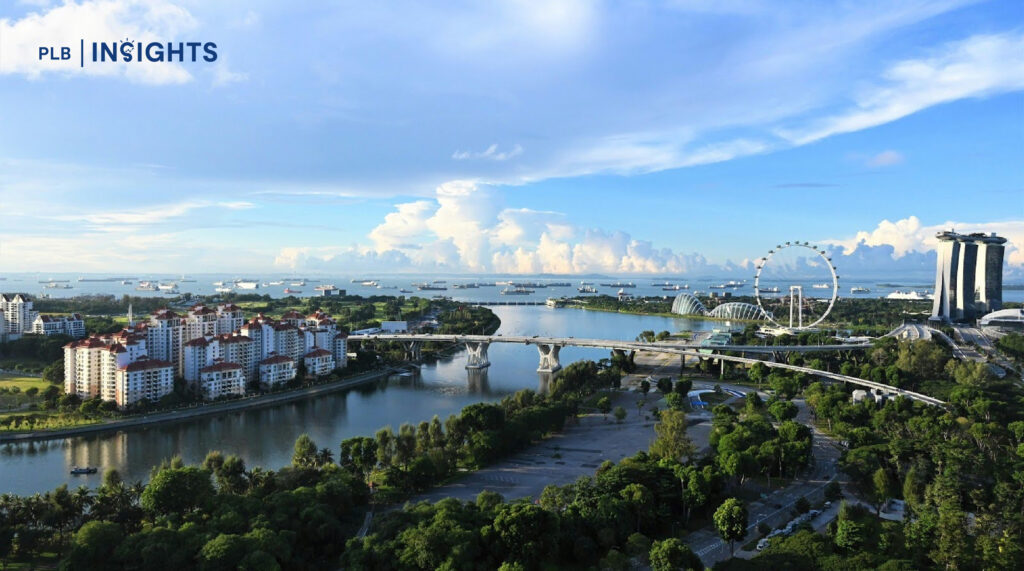
3. Projected Resident Population of 7 Million by 2030
The projected population growth to 7 million by 2030 implies a rising demand for housing, opening doors to potential real estate investment opportunities.
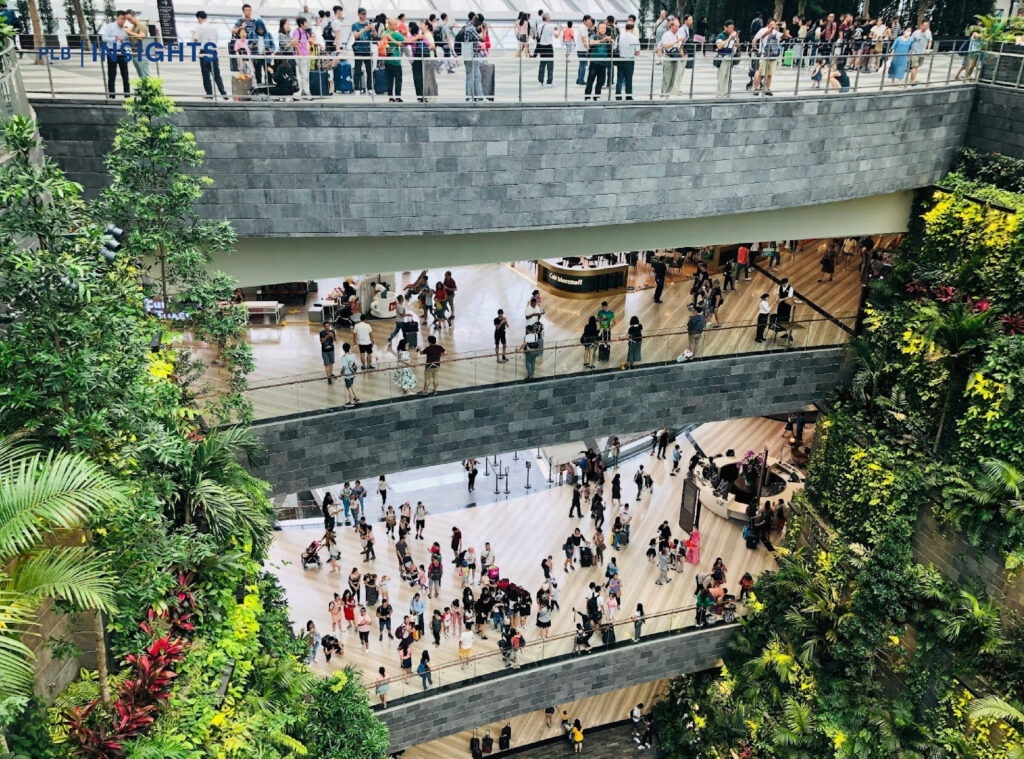
4. Strong Monetary Policies
Stable interest rates, backed by strong monetary policies and quantitative easing, creates a favourable environment where citizens and residents can more easily afford homes.
5. Land Control by The Government
Through prudent management of land and residential development, the Singapore government has successfully prevented oversupply, speculation, and volatile housing market fluctuations. This strategy facilitates sustainable growth, while addressing infrastructure, environmental, and housing equity concerns for a more inclusive urban development.
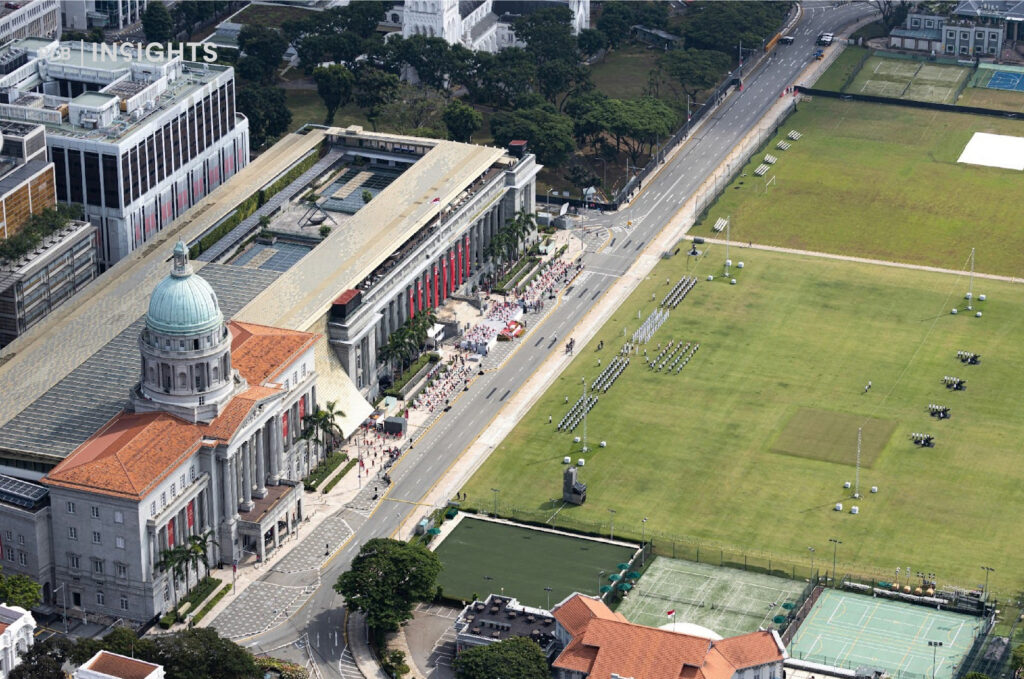
6. High Home Ownership Rate
At around 90%, Singapore holds the highest home ownership rate globally, resulting in a constantly active and efficient real estate market.
7. Strong Governance
Singapore’s transparent and effective governance ensures the rule of law prevails, and property rights are protected, fostering a secure environment for real estate transactions. Additionally, efficient regulatory frameworks and enforcement contribute to a stable and orderly market, reducing the risk of fraud or market distortions. Overall, strong governance provides a foundation for trust and stability in the real estate sector, attracting investment and promoting sustainable property market growth.
8. Global Financial Hub Status
As a global financial hub, Singapore’s attraction for international investment and skilled professionals fuels real estate demand. The presence of multinational corporations and financial institutions provides a stable job market, sustaining residents’ income and strengthening long-term property value.

9. Residential Property Prices Get Boost from HDB Subsidies & Grants
HDB subsidies and grants help aspiring homeowners in realising their dreams by making HDB BTO or resale options more affordable. These grants act as an initial injection of funds into the local real estate market, circulating further as HDB owners upgrade to private properties.
10. Strong Pool of Expatriates
Being a global financial hub with good governance and efficient monetary policies has opened the floodgate to a significant number of expatriates. This has further increased the demand for housing, particularly rental demand, and creating a robust real estate market as a whole.
Understanding the overall strengths of Singapore’s real estate market sets the stage for a deeper dive into specific trends. Which brings us onto our next section where we delve deeper into the price trends of resale non-landed private residences.
Price Trends For Non-Landed Private Residences
In this section, we will examine the price growth trends of resale non-landed private residences, including Executive Condominiums, from 2017 to 2024. Our goal is to understand the growth potential of these properties. For clarity, we’ve divided our analysis into the different regions of Singapore.
West Region
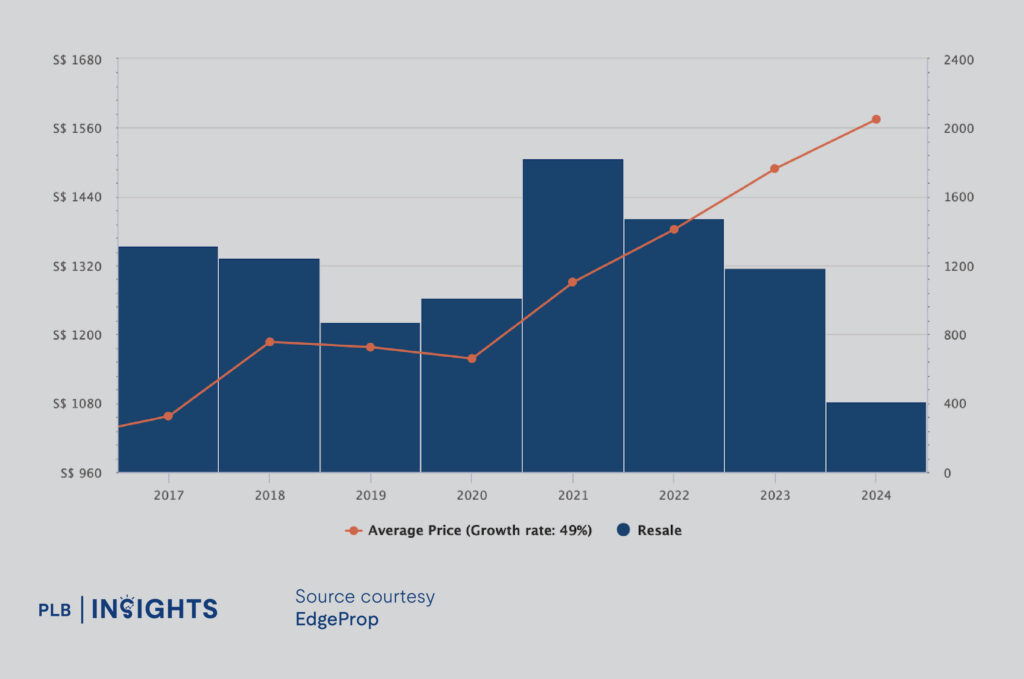
As shown in the graph above, the average price per square foot (PSF) for resale non-landed private residences in the West region increased by 49% from 2017 to 2024, rising from $1,058 PSF in 2017 to $1,575 PSF in 2024.
East Region
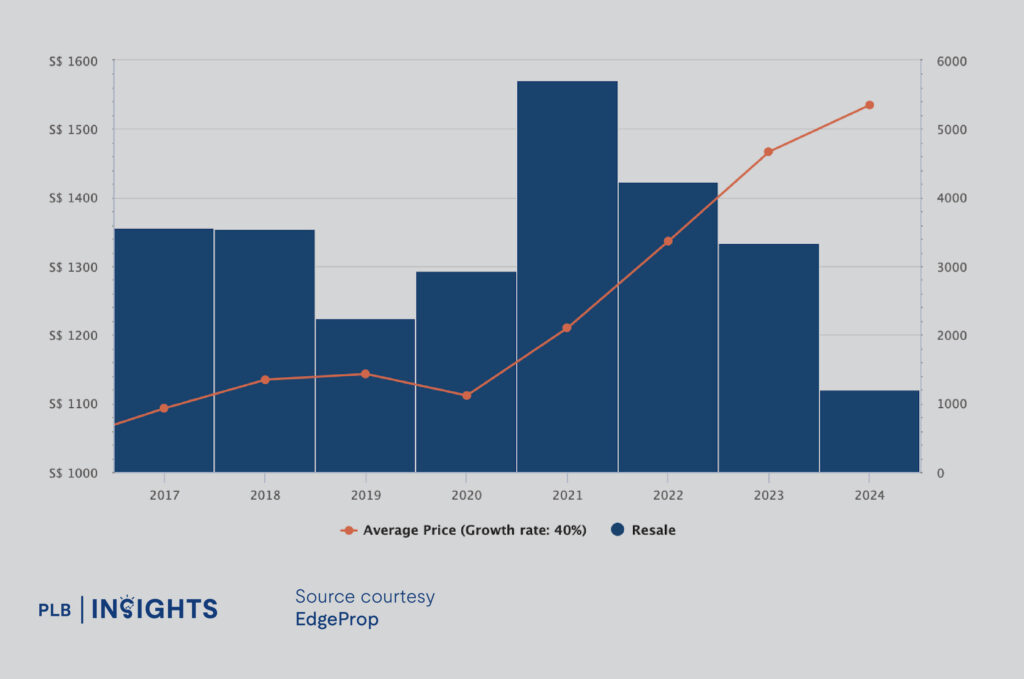
From 2017 to 2024, the average price per square foot (PSF) for resale non-landed private residences in the East region increased by 40%, rising from $1,093 PSF in 2017 to $1,535 PSF in 2024.
North Region
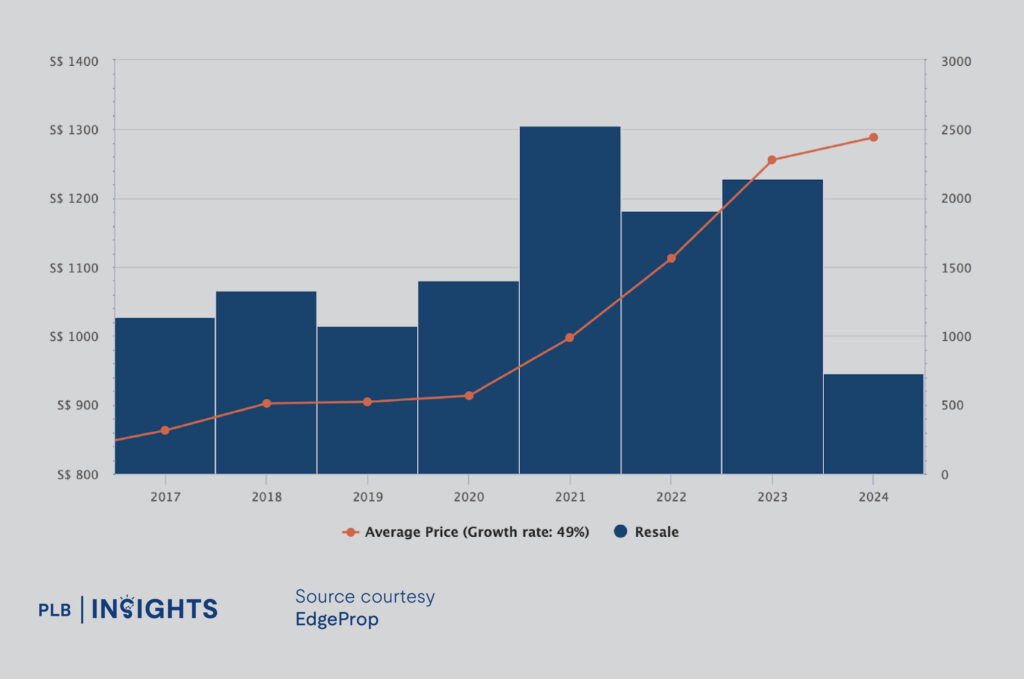
The average price per square foot (PSF) for resale non-landed private residences in the North region grew by 49% from 2017 to 2024, rising from $863 PSF in 2017 to $1,288 PSF in 2024.
North-East Region
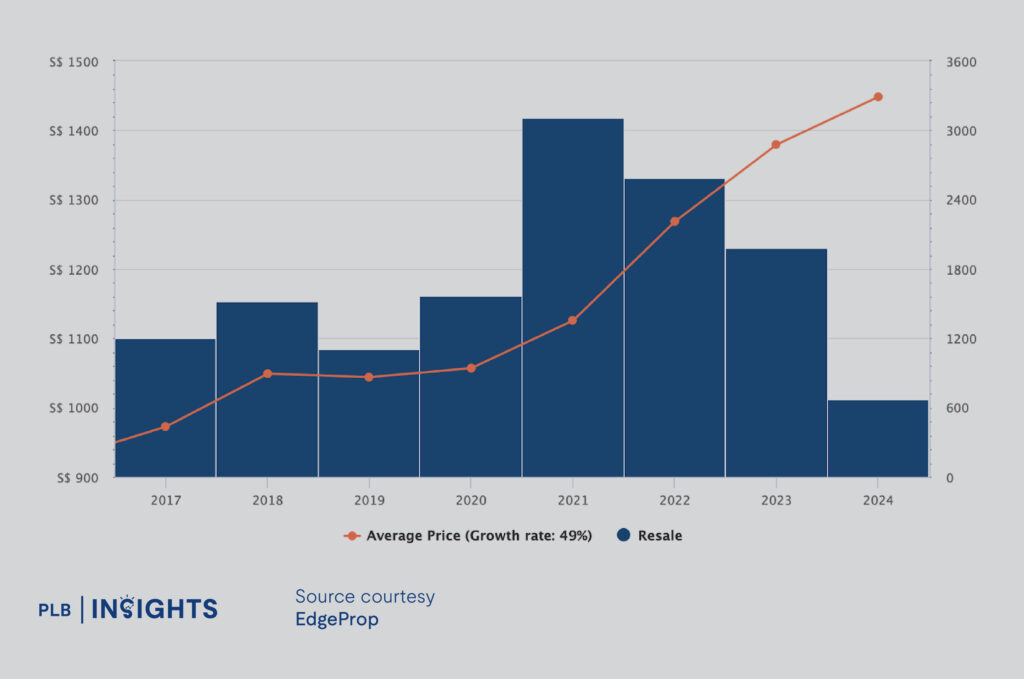
Over an 8-year period from 2017 to 2024, the North-East region saw a 49% increase in the average price per square foot (PSF) for non-landed private residences, rising from $973 PSF in 2017 to $1,448 PSF in 2024.
Central Region
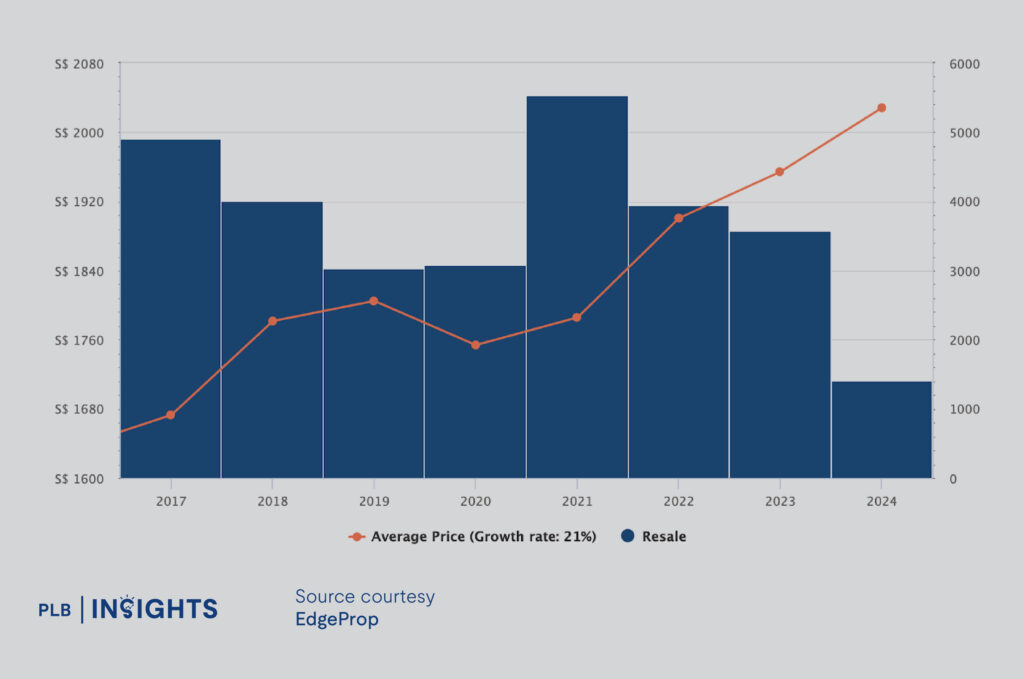
Between 2017 and 2024, the central region experienced a 21% increase in the average price per square foot (PSF) for non-landed private residences, rising from $1,673 PSF in 2017 to $2,028 PSF in 2024.
Analysing The Price Trends Of The Different Regions
Looking at the average price per square foot (PSF) growth of non-landed private residences across different regions from 2017 to 2024, we observe varying trends. The West, North, and North-East regions saw a significant 49% increase, while the East experienced a growth of 40%. In contrast, the Central region showed a more modest growth of 21%.
The comparatively lower growth in the East and Central regions could be due to the premium entry prices that is close to the upper limit of what buyers are willing to pay for properties in those areas. It’s important to note that these trends represent averages and may not reflect the situation for every property. Each development and property has its unique features and appeal to specific buyer demographics.
Nevertheless, these average trends indicate robust growth in the prices of non-landed private residences over the years. This growth trajectory is expected to continue in the future, albeit possibly at a slower pace.
With a clear understanding of the overall market strengths and price trends, you are better equipped to make informed decisions about your first real estate investment. Different seasons of the real estate market will have varying trends across the different regions of Singapore. It is crucial to analyse the specific trends of your chosen property within your desired region to gauge its fair value, minimising the risk of overpaying. This careful analysis ultimately allows you to extract the optimal value from your investment.
Key Considerations for Your First Real Estate Investment
To achieve success in real estate investing, your first home must have growth potential to serve as a solid foundation for future investments. While the tips provided here are not exhaustive and cannot guarantee capital appreciation, they offer valuable guidelines based on our years of expertise and thorough research.
Proximity to amenities and transportation nodes
Choosing a property for your first home that is near amenities and accessible by public transportation is crucial. Such a property will attract more potential buyers when you decide to sell, helping you command a desired price. Additionally, a convenient location with nearby amenities will also appeal to a wider pool of potential tenants. Renting out an extra bedroom can help cover mortgage payments or provide income to invest in other revenue-generating assets, aiding in the downpayment for your next upgrade. This arrangement is particularly beneficial for new real estate investors, offering an extra income stream.
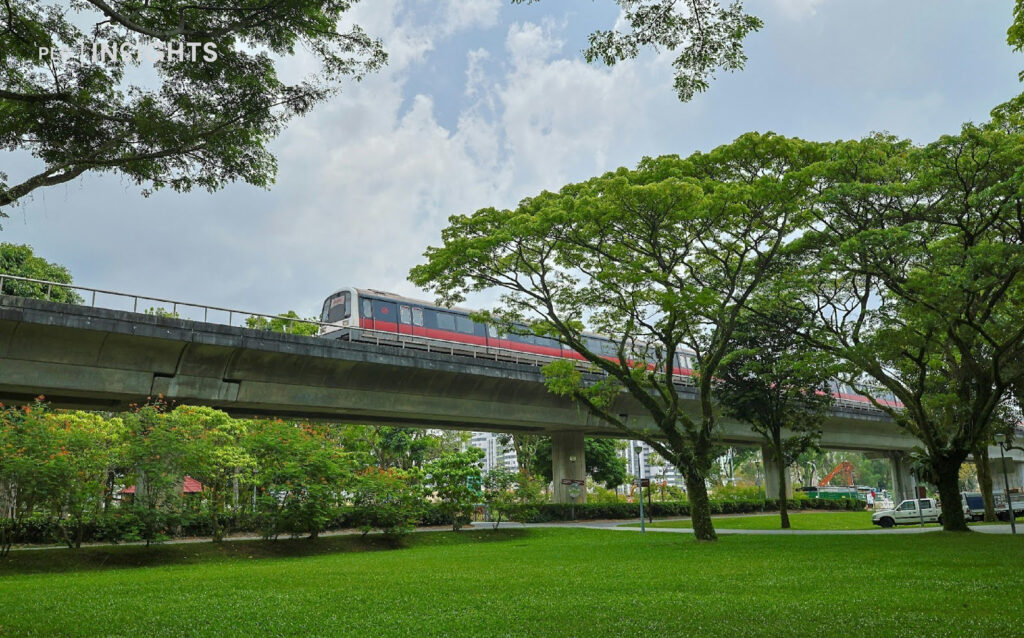
Historical transaction volume within the development
As we often emphasise, choosing a property in a development with a high volume of transactions can be advantageous for capital appreciation. Previous sale prices in the development set benchmarks for future sales, and frequent transactions can lead to smoother and faster capital appreciation. Therefore, it’s wise to select a property in a mid-sized to large development for your first home. A mid-sized development typically contains 400-700 units, offering a good balance of transaction activity and potential for growth.
Surrounding developments and upcoming major transformations
The Urban Redevelopment Authority’s (URA) planned developments, along with nearby commercial and housing projects, are crucial in making your property attractive to buyers or tenants. For instance, a condominium near a landed enclave might attract empty nesters downsizing. Similarly, being close to major transformations, like the upcoming Jurong Lake District business hub, can appeal to tenants looking for convenient access to work and amenities. These developments often lead to increased housing demand and higher capital appreciation. It’s important to consider the timeline of these transformations and ensure they align with your exit strategy to maximise your property’s potential benefits.
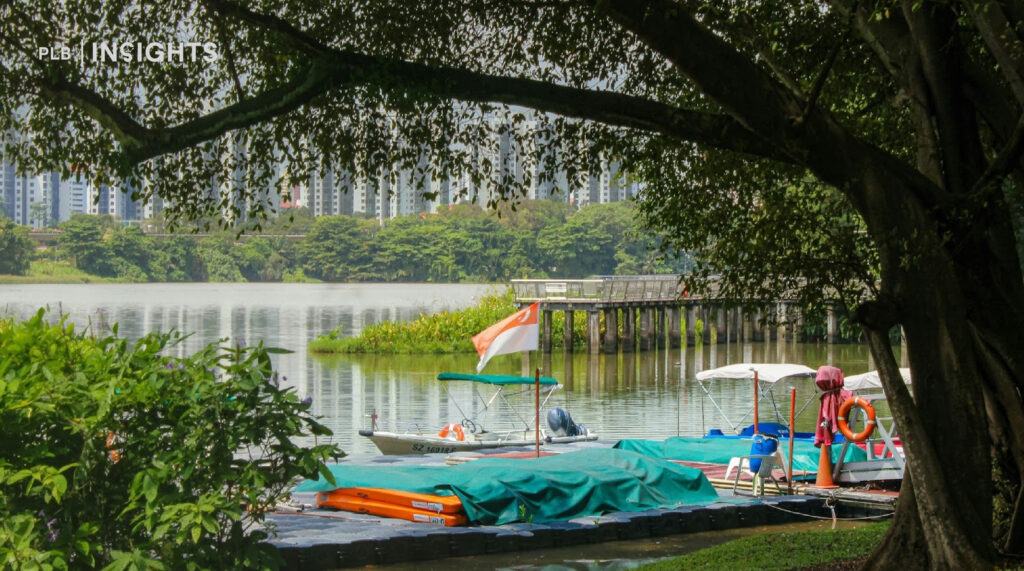
Takeup rate for similar configurations of your chosen property
When searching for your first home, it’s important to analyse the demand trends for your desired property type in the neighbourhood. For example, if you’re interested in a 3-bedroom unit, check online real estate portals for the number of listings and the take-up rate of similar units in that area. A high take-up rate indicates popularity, making it easier to sell in the future. Conversely, many listings with low take-up rates suggest lower appeal, which could make it challenging to sell the property later.
Housing Measures Consideration
Embarking on a journey into real estate investment demands meticulous planning and attention to detail. To pave the way for a successful venture, it’s crucial to consider key housing measures. Here are some housing measures you need to keep in mind:
Additional Buyer’s Stamp Duty (ABSD)
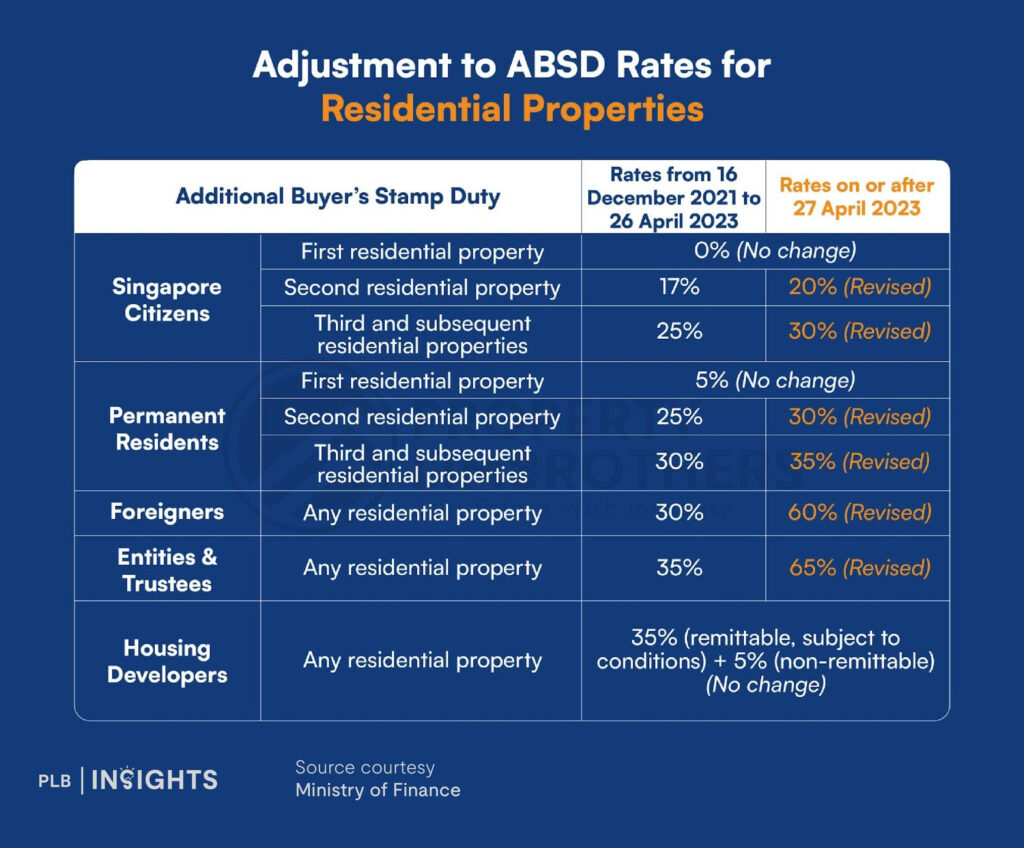
The high Additional Buyer’s Stamp Duty (ABSD) rates, currently 20% for Singapore Citizens and 30% for Permanent Residents on the purchase of a second property, pose challenges for real estate investment planning. To reduce ABSD costs, strategic timing in selling your current property and acquiring the next one is essential.
Another option is the ‘decoupling’ strategy for your first home purchase. This allows the non-owner spouse to buy a second property solely in their name, avoiding ABSD. However, this approach limits CPF funds and the loan amount from financial institutions, requiring thorough financial planning. Both spouses must ensure they have sufficient funds for their real estate investment journey.
Buyer’s Stamp Duty (BSD)
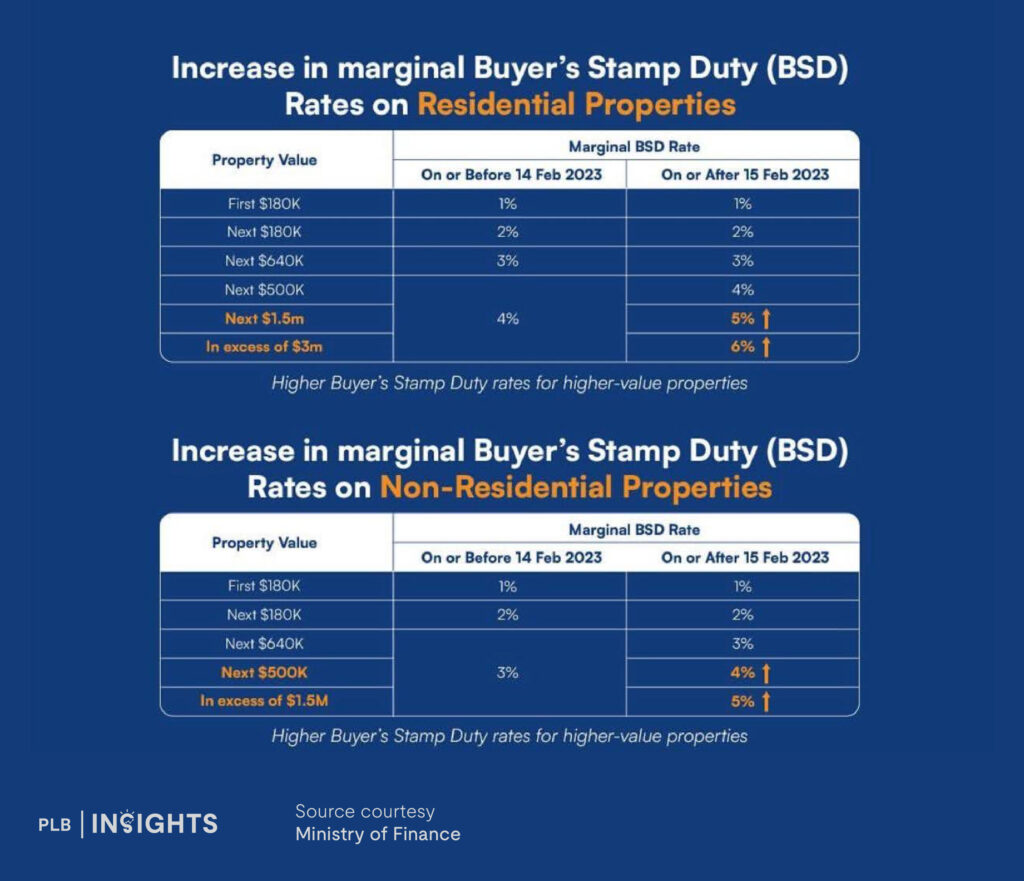
Another essential consideration for successful property investment in Singapore is the Buyer’s Stamp Duty (BSD). BSD is a tax levied on property purchases, calculated based on the purchase price or market value, whichever is higher. The rates are progressive: 1% on the first $180,000, 2% on the next $180,000, 3% on the following $640,000, and 4% on the amount exceeding $1 million. Understanding BSD is crucial for budgeting and financial planning, as it significantly impacts the overall cost of acquiring property. Factoring in BSD early can help you make informed investment decisions and avoid unexpected financial strain.
Loan-To-Value Ratio (LTV)
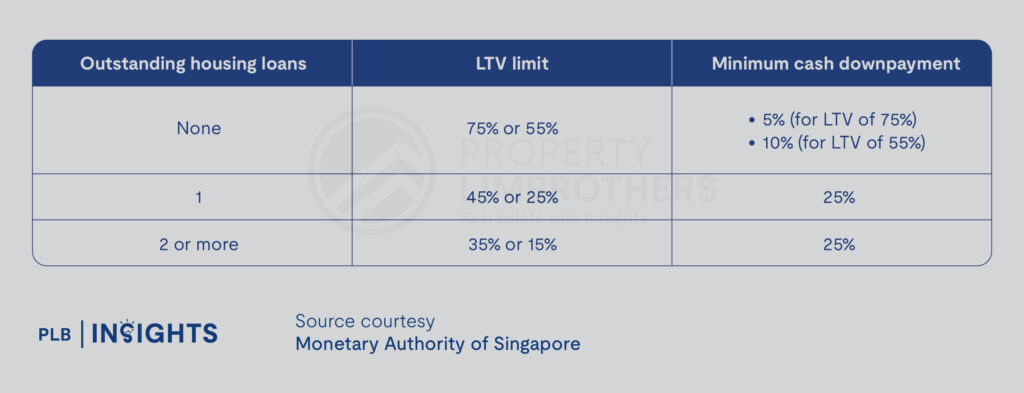
The Loan-to-Value (LTV) ratio is a pivotal factor in real estate investment planning. It dictates the maximum amount you can borrow from financial institutions for property purchases, based on the property’s value. Currently, for residential properties, the LTV ratio is set at 75% for the first loan and 45% for the second loan. This implies that for your first property, you must fund at least 25% of the property’s value with cash or CPF funds, and for the second property, you must finance at least 55%. Understanding and adhering to the LTV ratio is vital for prudent financial management in real estate investing. Referencing the table, note that a lower LTV limit applies if the loan tenure exceeds 30 years (or 25 years for HDB flats) or extends beyond the borrower’s age of 65 years.
Total Debt Servicing Ratio (TDSR)
The Total Debt Servicing Ratio (TDSR) is another essential measure in real estate investment. It assesses your ability to manage all existing debts, including the new property loan, relative to your income. The current TDSR limit is 55%, meaning your total monthly debt obligations, including the new property loan, should not exceed 55% of your gross monthly income. Adhering to this ratio ensures that you borrow within your means and can comfortably manage your financial obligations. It’s crucial to calculate your TDSR before committing to a property purchase to ensure financial prudence and avoid overleveraging.
In Conclusion
In conclusion, using your first home as a foundation for real estate investment in Singapore is achievable within the robust and stable local market. Success requires a deep understanding of the real estate landscape, prudent financial planning, and clear long-term goals.
Careful consideration of essential factors such as location, market trends, and surrounding developments is crucial. Additionally, having a well-defined exit strategy is vital, taking into account the various housing measures discussed in this article. With patience, foresight, and careful financial management, your first home can indeed pave the way for successful ventures into real estate investing in Singapore.

Join us at the upcoming Property Summit 2024 to gain invaluable insights from real estate experts and learn essential skills for successfully navigating the market. Click here to reserve your spot at an Early Bird special price.
Disclaimer: Information provided on this website is general in nature and does not constitute financial advice or any buy or sell recommendations.
PropertyLimBrothers will endeavour to update the website as needed. However, information may change without notice and we do not guarantee the accuracy of information on the website, including information provided by third parties, at any particular time. Whilst every effort has been made to ensure that the information provided is accurate, individuals must not rely on this information to make a financial or investment decision. Before making any decision, we recommend you consult a financial planner or your bank to take into account your particular financial situation and individual needs. PropertyLimBrothers does not give any warranty as to the accuracy, reliability or completeness of information which is contained in this website. Except insofar as any liability under statute cannot be excluded, PropertyLimBrothers, its employees do not accept any liability for any error or omission on this web site or for any resulting loss or damage suffered by the recipient or any other person.







